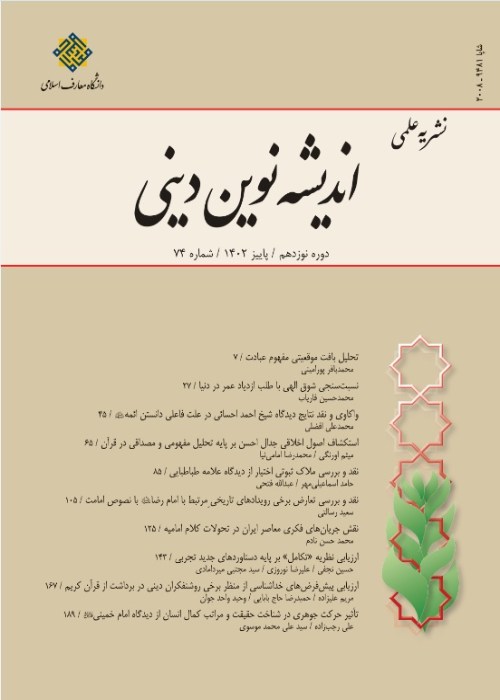فهرست مطالب
فصلنامه اندیشه نوین دینی
پیاپی 23 (زمستان 1389)
- تاریخ انتشار: 1389/12/28
- تعداد عناوین: 7
-
-
صفحه 155
-
صفحه 175
-
Page 9Perceiving the meaning of Quranic verses requires its own reasonable method. When enough knowledge of the methods occurs, one can perceive the real intention of commentators. On the other hand, classic hermeneutics has been founded to make usaware of the principles and methods of perceiving the text, and in this way, it has led to vast fundamental changes in the field. Regarding what is common between Quranic exegesis and classic hermeneutics, it is necessary for both to use the findings of oneanother. Following such an aim, therefore, the paper has studied the most important bases in the field.
-
Page 39The process of human education consists in an organized and meaningful changing. The changing necessarily has an origin and leads to an end. The process begins from a starting-point and an end. It consists in an agent, a subject, a course of time and determined boundaries. The study has intended to explain the boundaries of human education, philosophically called cycle of education. And for the cycle to be well explained in the religious aspect, some comparison has been made with existentialism.
-
Page 65Among Christian scholars, a unique definition of faith has been given by Paul Tillich. In his view, faith is an ultimate attachment of a person which can belong to finite or infinite beings leading him toward prosperity or atrocities. The object of human ultimateattachment includes either a material or an immaterial thing for the sake of which a believer is eager for falling victim to it. As he believes, neither wisdom nor human will contradict faith. In the faith meant by him, there is also an element named as couragewhich plays an important role in overcoming the potential doubts and fears ahead.
-
Page 113Some traditions have known Quran and lineage to be interrelated.Among them, those in Nahj al Balagha have been proved of novalidity. In many of the early and recent sources of Shia andSunni, however, such traditions have been differently quoted andhave, therefore, been counted to be authoritative. Implicativelyconsidered, three modes of interrelation can pertain to them; thatis, interrelation in scientific and practical manners, in rank anddignity and in helping and supporting one another. Analytic studyof the modes would lead to some results and corollaries in theQuranic studies. This paper has dealt with such modes ofinterrelation analytically.
-
Page 133Personality, being one of the most important subjects in humanity, has a particular place in such fields as management, politics andeducation. The background of subject can be sought in psychologywith the special sub-field psychology of personality. In the paper, using lexical sources and Muslim scholars` opinions, it has beensought to explain Quranic conceptions of human spirit and humansoul and their place in personality psychology. The question «what» of spirit and soul, their meaning in psychology ofpersonality, and the place of human soul when discussingpersonality as an agent unifying human behavior, have formed theproblems of the paper.
-
Page 155In Islamic philosophical thought, human being has been known of particular dignity. As Sadra`s philosophical thought has been founded on the uniqueness of philosophy, mysticism- in particular that of Ibn Arabi-, revelation and the traditions of pure Imams, hehas studied human dignity from different dimensions. In Sadra`s, human being, after the creation of the plant and animal worlds, comes to existence in ascending arc of existence. In this way, human being in addition to its being existentially characterized with the worlds, is also characterized with higher perfection. And it is the fact by which human being can be known as a full example of being. In this way, he manifests all the names of God; therefore, a perfect man would be a full example for all Divine attributes.
-
Page 175Pascal, one of the great geniuses and intellectuals in the west, has posed a proof for the existence of God called Pascal's Wager. Having explained theoretical and practical reasoning, he founded the rational and practical principle by which some human`sdecisions are justified. He, then, applied the rule in religious studies to prove the necessary of a religious life. This study, after explaining his reason, is to assess in two parts his practical and theoretical reasoning and his wise rule.


